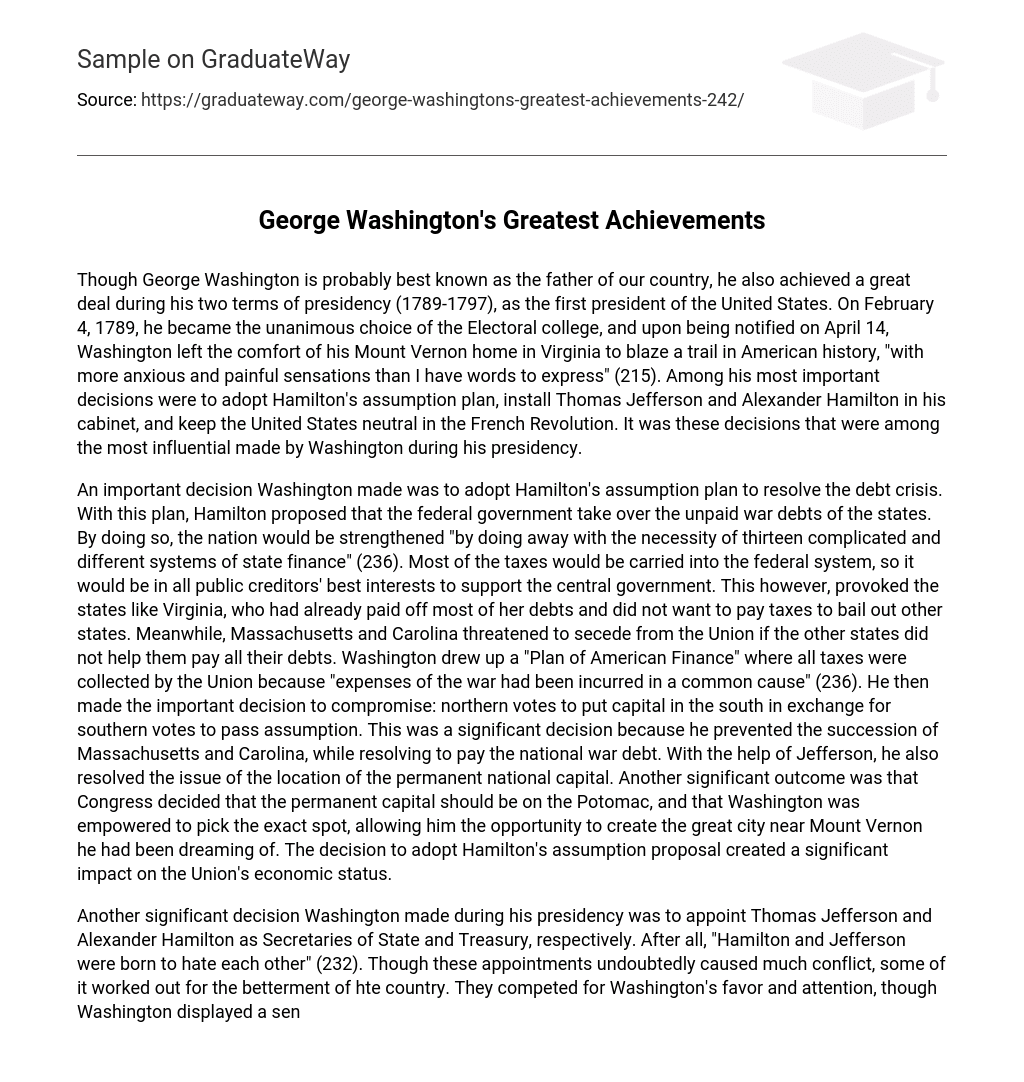Although George Washington is primarily known as the father of our country, he also accomplished a great deal during his two terms as the first president of the United States (1789-1797). On February 4, 1789, he was unanimously chosen by the Electoral college. Upon receiving notification on April 14th, Washington departed from his Virginia home at Mount Vernon to make history in America. He admitted to feeling “more anxious and painful sensations than I have words to express” (215).
Some of his most consequential decisions as president were adopting Hamilton’s assumption plan, appointing Thomas Jefferson and Alexander Hamilton to his cabinet, and maintaining US neutrality throughout the French Revolution. These choices had a profound impact during Washington’s presidency.
Washington decided to adopt Hamilton’s assumption plan, which aimed to address the debt crisis by having the federal government assume states’ unpaid war debts. This plan sought to strengthen the nation by simplifying state finance systems and collecting most taxes at the federal level. However, it faced opposition from states like Virginia that had already paid off their debts and did not want to assist other states with their taxes. On the contrary, Massachusetts and Carolina threatened secession unless they received help in repaying all their debts.
In response, Washington devised a “Plan of American Finance” that involved collecting all taxes at the federal level for war expenses. As a compromise, he offered northern votes in favor of establishing the capital in the south in exchange for southern votes supporting assumption. This compromise prevented Massachusetts and Carolina from seceding while resolving the national war debt issue. With Jefferson’s assistance, Washington also resolved disputes over where to locate the permanent national capital.
Congress made an important decision by selecting Potomac as the permanent capital location and granting Washington authority over choosing its precise position. This allowed him to fulfill his dream of creating a magnificent city near Mount Vernon.The Union’s economic status was greatly affected when it accepted Hamilton’s assumption proposal.
Another important decision made by Washington during his presidency was to appoint Thomas Jefferson and Alexander Hamilton as Secretaries of State and Treasury, respectively. Despite the fact that “Hamilton and Jefferson were born to hate each other,” these appointments led to significant conflict. However, some of this conflict ended up benefiting the country. Jefferson and Hamilton competed for Washington’s favor and attention, but Washington remained fair in his decision-making, not allowing friendship to bias his choices. He selected his cabinet members based on their ideals, rather than simply choosing popular leaders from his party. By having Jefferson and Hamilton simultaneously hold these offices, partisan divisions grew and eventually influenced present-day politics. Although this decision carried a significant message from Washington, it may not have been entirely wise as the two men spent a great deal of time arguing instead of working. Both Jefferson and Hamilton threatened to resign multiple times, but Washington urged them to stay, partly for selfish reasons, even though they could never agree with each other. Thanks to Washington’s decision to include these two individuals with opposing views, the divide between partisans became more apparent and continues to impact American politics today.
Washington’s notable achievement was maintaining US neutrality during the French Revolution and the war between England and France. This decision was challenging because of France’s significant role in the American Revolution, leading some citizens to believe that the US was betraying France and freedom. Washington justified his choice by stating that if the nation progressed without interference, it would become respected and one of the happiest countries on Earth (277).
This decision held immense importance as it led to his later “face-saving proviso” (284) known as the Neutrality Proclamation during the war between England and France. The proclamation established America’s policy of neutrality towards European conflicts and influenced future foreign policies. By avoiding involvement in the conflict, Washington allowed the young nation to continue growing and strengthening before engaging in overseas wars. Joining any war at that time would have depleted resources, making Washington’s decision a wise one.
George Washington was a charismatic and influential man who made both good and bad decisions that shaped the fate of America. He adopted a compromised version of Hamilton’s assumption plan, satisfying all states while addressing the national debt. Despite their differing views, Washington appointed Thomas Jefferson and Alexander Hamilton to his cabinet, deepening the divide between their parties and influencing politics for years to come. This demonstrated that party affiliation does not always hinder the potential for good ideas to benefit the country. Additionally, Washington successfully maintained neutrality in the French Revolution, setting the tone for future foreign policy and allowing the nation to grow before engaging in overseas matters. Therefore, Washington’s role as a founding father encompassed more than just crossing the Delaware; he made numerous important decisions crucial to the development of the young United States.





